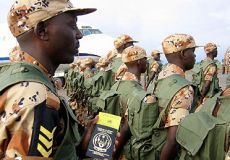Airlift of additional AU troops to Drfur may start this month
KIGALI, June 2 (AFP) — The airlift of some 5,000 additional men to be deployed in the troubled Darfur region of western Sudan as part of the African Union (AU) Mission could get underway later this month, a US senior official said Thursday.

|
|
Rwandan soldiers belonging to the African Union wait to board a plane to be dispatched to the Darfur region of Sudan, April 2005. (Reuters). |
“I hope some can start to come in this month and (the rest) be brought in over the summer, but ultimately it’s an African Union decision,” Robert Zoellick, the US deputy secretary of state, told journalists in Kigali where he attended a meeting of the Common Market for Southern and East African states (Comesa).
“The Rwandans have told me they are ready to go and the Nigerians said they are ready to go,” he added.
Senegal and South Africa are also expected to be among countries contributing troops to the expanded mission. The US will provide the planes for the airlift.
Asked whether the US considered the AU troops needed a tougher mandate in order to be effective, Zoellick said his understanding was the AU felt that a more active use of the present mandate would meet needs, but added that the US would be supportive of a stronger mandate if the AU felt this was necessary.
“Where the AU force is in place they are able to stop violence between militia and rebels. The problem is not enough peacekeepers on the ground,” he said.
Sudanese government officials have expressed resistance to any beefing up of the AU force’s mandate.
The African Union decided late April to increase the number of its Darfur force to 7,700, including 5,500 troops and 1,600 civilian police plus military observers, from some 2,400 currently.
Zoellick took advantage of his visit to the summit to meet with several African heads of state also attending and to discuss various aspects of the Darfur conflict. Among them were Omar al-Bashir of Sudan, Yoweri Museveni of Uganda, Nigerian president and head of the African Union Olusegun Obasanjo, Zambia’s Levy Mwanawasa and their host, Rwanda’s Paul Kagame.
Asked about his meeting with Bashir, Zoellick said: “One point I made is that they (the Khartoum government) were living with the legacy of their own actions in 2003 and 2004. If they want to take another course now there’s going to be a lot of distrust.”
A US official in the delegation said Zoellick would leave Kigali very early Friday for El-Fasher (Darfur) where he would meet with AU Peace and Security Commissioner Said Djinnit.
From there he would travel north to Kutum displaced camp and talk to AU contingent troops, tribal leaders and NGOs active in the camp.
The aim is to make an ongoing assessment of the situation on the ground, the official said.
Zoellick will then continue to the Sudanese capital Khartoum where he will meet with Sudanese Vice-President Ali Uthman Taha and UN special envoy to Sudan Jan Pronk.
“The North-South Agreement (ending 21 years of war between the Sudanese government and southern rebels) offers a model for Darfur. If people see they can achieve their aspirations through agreements then it’s an alternative path to violence,” the official continued.
The conflict in the Darfur region, which started over two years ago, is estimated by the UN to currently affect over 2.4 million people, 1.8 million of them internally displaced or having fled to neighbouring Chad.
